

THE TEMPLE NEWS
A watchdog for the Temple University community since 1921.
Lawrence Ukenye Editor-in-Chief
Julia Merola Print Managing Editor
Fallon Roth Digital Managing Editor
Megan Phillips Chief Print Copy Editor
Kayla Maguire Chief Digital Copy Editor
Oliver Sabo News Staff Writer
Sarah Frasca Opinion Editor
Molly Fiske Assistant Opinion Editor
Duay Augustine Assistant Features Editor
Nick Gangewere Sports Editor
Javon Edmonds Assistant Sports Editor
Samuel O’Neal Assistant Sports Editor
Maggie Fitzgerald Director of Audience Engagement
Emily Lewis Public Engagement Coordinator
Taylor Hargraves Audience Engagement Editor
Sara Wexler Audience Engagement Editor
Chris Duong Sports Social Media Manager
Robert Joseph Cruz Photo Editor
Noel Chacko Staff Photographer
Earl Kufen Staff Photographer
Nate Pullano Multimedia Editor
Will Colavito Multimedia Editor
Joelle Pacheco Print Design Editor
Allyson Tharp Graphic Design Editor
Isabella Medina Web Editor
Rachel Townsend Data Editor
Olivia Hall Podcast Editor
Rose Mastrangelo Advertising Manager
Matthew Eaton Advertising Manager
Kurt Nolasco Business Manager
The Temple News is an editorially independent weekly publication serving the Temple University community.
Unsigned editorial content represents the opinion of The Temple News.
Adjacent commentary is reflective of their authors, not The Temple News.
The Editorial Board is made up of The Temple News’ Editor-inChief, Managing Editor, Digital Managing Editor, Chief Copy Editors, and Opinion Editors. The views expressed in editorials only reflect those of the Board, and not of the entire Temple News staff.
CORRECTIONS
ON THE COVER
A dining hall staff member hands a student a plate of food at the Johnson and Hardwick dining hall on April 17.
NOEL CHACKO / THE TEMPLE NEWS
Contacts
letters@temple-news.com
features@temple-news.com
sports@temple-news.com
The Temple News is located at: Student Center, Room 243 1755 N. 13th St. Philadelphia, PA 19122
On April 4, 2023, an article on Page 9 titled “Temple, accommodate students during Ramadan” misstated the status of the Muslim Students Association’s access to the Paley Building as a prayer space.
Accuracy is our business, so when a mistake is made, we’ll correct it as soon as possible. Anyone with inquiries about content in this newspaper can contact Editor-in-Chief Lawrence Ukenye at editor@temple-news.com.
CITY
How a new mayor would impact Temple’s safety
Primary elections for Philadelphia’s mayoral candidates will take place on May 16.
BY GRACE RUFALO For The Temple NewsThe race for Philadelphia’s 100th mayor to succeed Mayor Jim Kenney is underway with primaries taking place on May 16 and general elections taking place on Nov. 7. Each candidate has discussed issues that impact Temple University as well as the entire city.
Multiple candidates say they will implement policies that would improve safety surrounding Temple’s Main Campus like increasing the university’s police force, cracking down on illegal guns and providing more resources to those impacted by violent crime.
Voters must register by May 1 and request a mail-in or absentee ballot by May 9. After three candidates dropped out, there are currently 10 candidates competing for mayor with nine Democratic candidates and one Republican.
With an increase in gun violence and crime near Main Campus, many students are focused on the mayoral race and how the candidates will address crime.
At the first and only televised mayoral debate, which featured seven of the Democratic candidates on April 11 and was hosted at Temple Performing Arts Center, Temple Student Government President Gianni Quattrocchi asked candidates how they will address public safety and make Philadelphia a safer place for Temple students.
Several candidates have listed gun violence as one of their top priorities. Former Philadelphia City Council members Helen Gym and Allan Domb have said they would declare a state of emergency if elected.
Gym said she would bring all relevant agencies together to address gun violence, improve 911 response times and issue non-police mental health crisis units.
Domb advocated for a public safety cabinet composed of all city departments and other stakeholders including Temple security to combat crime.
“I would conduct the meetings on a weekly basis, whether they take one hour or five hours,” Domb said. “There is nothing more important right now than getting public safety under control.”
Jeff Brown, a Shoprite and Fresh Grocer owner, who was recently endorsed by the Temple University Police Association, said that he plans to increase police wages and the number of police personnel.
“The Temple police is suffering from an understaffing problem just like the regular police and every other law enforcement department,” Brown said. “We have to raise starting wages, be competitive, and get that police department staffed up to protect our students.”
Pennsylvania State Rep. Amen Brown referenced the fatal shooting of Temple Police Sgt. Christopher Fitzgerald, and said he will work to reduce the number of violent offenders and priori-
tize warrant enforcement.
Following the death of Fitzgerald, 58 percent of students identified safety as the most important issue facing Temple, according to a March 2023 poll by The Temple News.
Former City Controller Rebecca Rhynhart emphasized the urgency of combating crime and said that she would activate the Emergency Operations Center to assist in a public health emergency.
The Emergency Operations Center is a control facility overseen by the Centers for Disease Control and Prevention that specializes in coordinating resources and experts together to respond to a public health threat.
There have been 497 homicides in Philadelphia over the last 12 months, with an average of 10 homicides per week, according to 6ABC Action News’ Neighborhood Safety Tracker.
Rhynhart said she would enlist the help of several departments like the Philadelphia Police Department, Departments of Behavioral Health and Public Health and the Streets Department to
make Philadelphia safer.
Rhynhart said she would also work with the district attorney and police commissioner to address gun violence.
Jonathan Iacovelli, a junior economics major who attended the debate, said he wanted to hear how candidates would address other issues, like quality of life.
“As someone living right off campus and as a Temple community member, crime is definitely a top issue,” said Iacovelli. “Although, I wish other issues like housing and the environment got addressed more as well as public transportation.”
When asked to grade current mayor Kenney’s performance, the candidates gave a range of answers with Amen Brown giving an F-, claiming Kenney doesn’t show up.

In his final budget plan, Kenney proposed more than $200 million for anti-violence programs and increased funding for the police department.
grace.rufalo@temple.edu
CHECK
ON SPOTIFY! REPRINT A biweekly roundup of some of the stories featured in print.


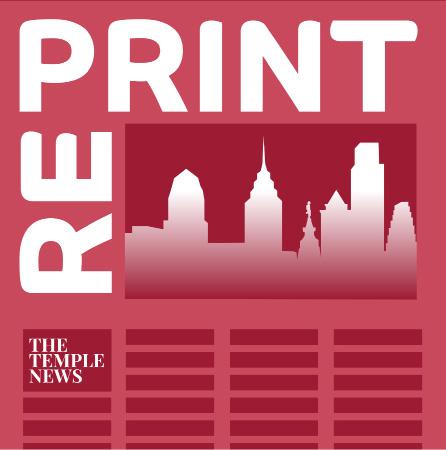
PLAYBOOK A rundown of some of the top stories featured in print.
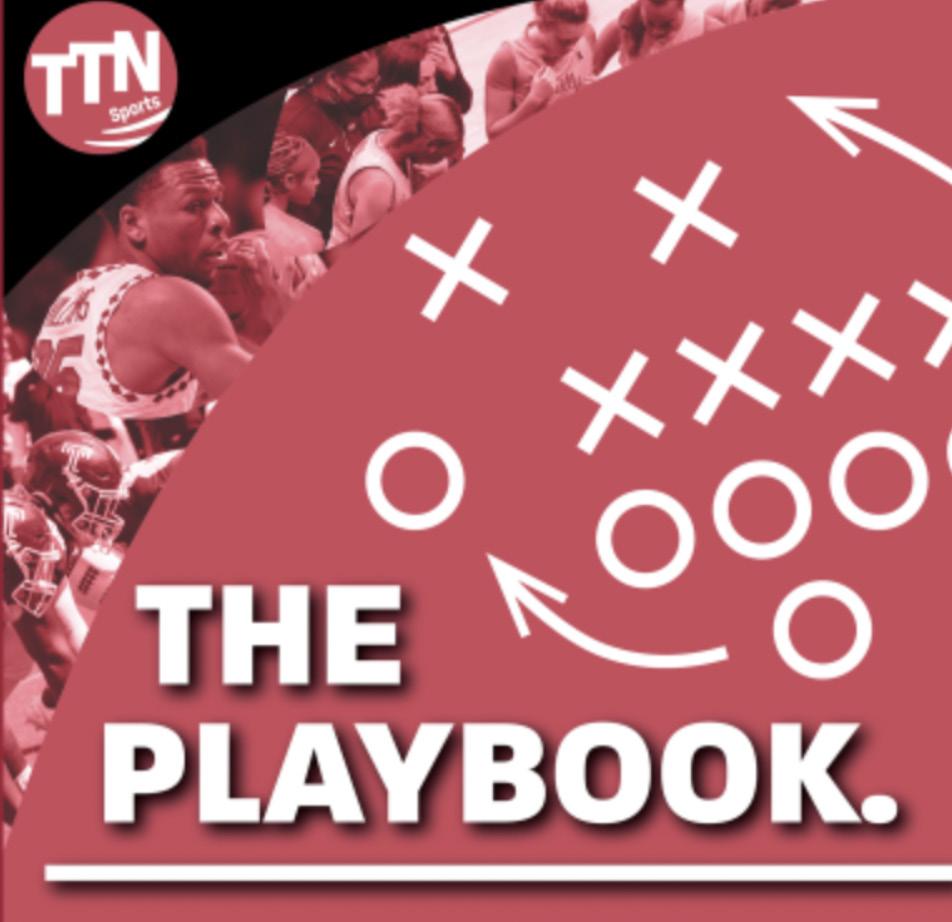
COMMUNITY
Residents plan to remember fallen police officer
BY RJ FRANCESCHINI ForThe 1700 block of West Montgomery Avenue will be named Sgt. Christopher Fitzgerald Way after the Temple police officer who was fatally shot on Feb. 18.
The bill to rename the block was introduced on March 23 by City Councilmember Curtis Jones Jr. on behalf of Council President Darrell Clarke who represents the 5th District of Philadelphia, which covers where the shooting occurred.
“Sgt. Fitzgerald will be remembered lovingly by his wife Marissa, four children and a close-knit extended family and for his commitment to his work and community by the Temple University Police Department and the greater Temple community,” Jones wrote in the resolution.
There is no definite date for renaming the street because other city agencies now control the process, said Joe Grace, Clarke’s communications director.
“We had the resolution introduced in City Council to rename that block in honor of Sgt. Chris Fitzgerald as a small gesture to recognize his great sacrifice that he made to protect the people of North Philadelphia and the Temple community,” Clarke wrote, in a statement to The Temple News. “We can never bring Sgt. Fitzgerald back, but we can honor him and keep his memory of service alive with this gesture. That’s why the street renaming is taking place.”
Temple Police Officer Leroy Wimberly has become a large contributor and organizer for the events and memorials for Sgt. Fitzgerald, and has been working closely with council members to create a large celebration on the day that the block’s name is officially changed.
The date isn’t certain, but Wimberly hopes to have the event sometime before the end of the Spring 2023 semester so the Temple community can enjoy this celebration of life.
“I’m just waiting on confirmation, because it has to be a date where everyone’s available,” Wimberly said. “I want everybody there. I want political, affiliated, TU, I want it big, city police and any other police departments in this country that want to come and support.”
On April 14, Wimberly helped organize a basketball game to commemorate Sgt. Fitzgerald, and has plans to organize similar events for Temple students and the surrounding community to enjoy before the renaming of the block.
“We’re going to work on something else like a softball game or football,” Wimberly said. “Cops and TU football against the kids or we just make up teams.”
Once the event date and details are determined there will be an email sent out inviting students to attend.
Michala Butler, a graduate journalism student who lives on the block, thinks the new name is a good idea, and hopes that there will be little pushback
from fellow community members and students, given recent tensions between residents and police.
“I think it’s representing the community in the right way as well as the police force that’s out on these streets everyday,” Butler said. “I think that it’s going to receive positive feedback, and I think that it also brings a little bit of light to the situation showing how Temple has come together as a community to support each other during this time, especially given the stuff that’s gone on with our administration.”
Nienke Oerlemans, a master in management student, also feels the new name for the block is a great way to honor Sgt. Fitzgerald’s legacy.
“I definitely think it is a good thing to keep the memory going,” Oerlemans said. “It was something that happened on our block here, it was absolutely awful and we were all affected by it, so I think it’s definitely good to keep the memories alive of him.”
A temporary memorial was created in the days following Sgt. Fitzgerald’s death, consisting of a framed photograph of the officer and flowers under a tent, but the temporary memorial has since been deconstructed.
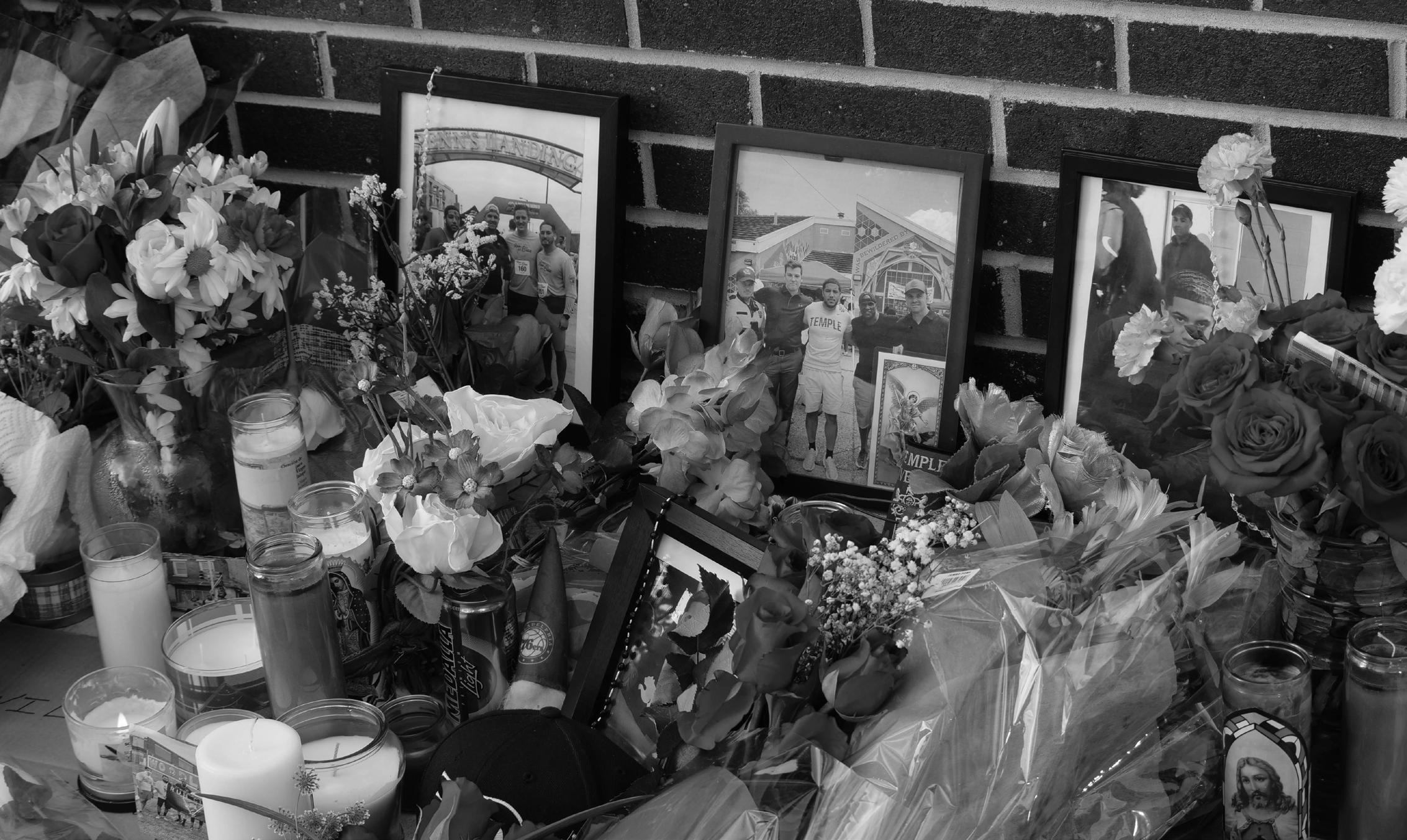
On Feb. 23, Wingard announced that the university had raised $450,000 to support Fitzgerald’s family.
Temple also covered the cost of the funeral and offered tuition remission for his family, should they choose to attend Temple.
A vigil was also held at the Bell Tower where friends, family, students and other community members celebrated the life of the fallen officer.
ronald.franceschini@temple.edu
@rfrances609
CRIME
Griffin outlines upcoming TUPD improvements
The department will use grant funding to retain officers and improve technology.
BY OLIVER SABO News Staff WriterIn the weeks following Sgt. Christopher Fitzgerald’s death, Campus Safety Services has made efforts to increase hiring and retention within the Temple University Police Department, despite a wait for state funding.
The department is working toward hiring and retention bonuses for new officers, and developing salaries that are competitive with other agencies to retain current ones, said Jennifer Griffin, vice president for public safety.
TUPD is fully staffed for communication center dispatchers and security officers, but is short on detectives, supervisors and patrol, Griffin said.
Campus Safety’s current process allows certified officers from other police departments to join TUPD, and will have a physical fitness test this month for new individuals to possibly join the department, Griffin said.
TUPD currently has two people in training at the Philadelphia Police Department Academy. The department also welcomed eight new officers on March 17, who recently entered the field training program.
Griffin said the training time for prospective officers that don’t have any experience, which could take up to a year and a half, can be a challenge.
“Unfortunately, unlike a lot of other professions, when you hire somebody, they then go to nine months of training, they come here for three weeks for onboarding, policies and procedures, and then they go on to their field training experience and that takes a couple of months before their out on their own,” Griffin said.
Douglas Green, a criminal justice professor, thinks that there are a variety of reasons that staffing has become an issue in many departments, including fewer applicants.
“Fewer applicants generally means as they start vetting people and restricting that population down to the best folks that they want to hire, they’re just finding fewer and fewer candidates along with the fewer number of applicants so that’s been a huge thing,” Green said.
TUPD, which updated its agreement with PPD on March 1, now receives citywide supplemental patrols, as opposed to just officers solely from the department’s 22nd District. The new system is more effective for patrols, and increases communication between the two departments, Griffin said.
“It’s working much better,” Griffin said. “I have, I wouldn’t say daily contact, but I would say probably two to three times a week I’m communicating with one of the executives at Philly talking about, ‘hey, this is the deployment, hey, we need this change,’ or they’ll come back and communicate back with us like ‘hey, we have this large event’ so a lot of communication.”
Alec Shaffer, president of Temple University Police Association, believes that patrols are the most critical operation for overall public safety.
“Staffing is still very much so a visible issue,” Shaffer wrote, in a statement to The Temple News. “[Eight] new officers is great and we are excited to have them but we need dozens more officers on top of that to make a noticeable difference.”
In order for bonuses to be effective retainment tools, the university needs to remove proposed subjective conditions that would prevent the payout of the bonus, Shaffer wrote. All officers would need to receive the bonus without conditions, he added.
Griffin is also anticipating the arrival of a $1.8 million grant from the Pennsylvania Commission on Crime and Delinquency to improve safety after it was announced on March 8. The funding will be used for hiring and retention bonuses, as well as gunshot detection technology, license plate readers and improved cameras.

Temple is researching safety improvements and deciding where they want to allocate funding before the money becomes available, Griffin said. Most grants don’t allow invoices until the funding is awarded so currently the
university can only plan how to use the money.
Green believes that these types of technology can help with investigations and identifying people who may be offenders.
“Whether that deterrent effect is going to actually play out in the short run, nothing seems more challenging, but it’s kind of what you can do with the money at hand in terms of trying to address the problem,” Green said.
Griffin hopes that students will start to see visible safety changes on and around Main Campus next semester, including retrofitted Code Blue phones that will have cameras. The university will also replace cameras that were identified as needing replacements in an audit earlier this year.
Temple will also increase the amount of cameras in areas with dead spots, Griffin said. The improvements will be partially covered by the PCCD grant, and partially by money that the university had already allocated to those efforts. oliver.sabo@temple.edu
Release the safety audit
On Jan. 27, 2022, following the fatal shooting of a Temple University student and other safety concerns, Temple announced a pledge to increase public safety efforts by forming a task force and hiring former Philadelphia Police Commissioner Charles Ramsey to conduct an audit of Campus Safety Services’ procedures.
The audit was conducted to increase the transparency of Campus Safety Services and is their first external audit in more than a decade.
In April 2022, Ramsey wrapped up his first month of the safety audit and anticipated sharing a draft of the results with former President Jason Wingard during the Fall 2022 semester, with the final version expected in late fall or early winter.
On April 11, Temple welcomed JoAnne Epps as the university’s acting president. During her introductory press conference at Sullivan Hall, Epps said she will be focusing on safety and enrollment by listening and engaging with students, faculty, staff, administrators and the surrounding community.
Although the audit was projected to only take several months to complete, it has yet to be published. The Editorial Board is urging Temple to release the results amid a change in leadership and a perspective shift towards prioritizing public safety communication following the fatal shooting of Sgt. Christopher Fitzgerald in February.
Ramsey is a partner with 21CP Solutions, a solutions-based public safety organization, to analyze Campus Safety Services’ policies
Include residents in search
and training practices.
After compiling information from the audit, Ramsey planned on hosting focus groups of about 10 members of the Temple Community to discuss their perspectives about safety on and near campus.
In 2022, there were more than 10,300 crime incidents in the 22nd Police District, which encompasses Main Campus, according to the Philadelphia District Attorney’s Office.
As of April 16, there have been 398 nonfatal and 99 fatal shooting victims, according to Philadelphia’s Office of the Controller.
Campus and public safety have been focal points of students’ grievances towards Wingard and Temple administration. On Feb. 28, students protested around Temple’s campus to demonstrate their frustration with administration’s handling of safety issues.
When given the option between safety, the Temple University Graduate Students’ Association strike and affordability as options, 75 percent of respondents identified safety as the biggest issue at Temple, while fifty-eight percent felt it was most important to them, according to a March 2023 poll by The Temple News.
The audit was expected to take approximately six months, but has now taken more than a year and has yet to be published. The Editorial Board urges Temple to release the results of the audit to act as a guide as the university and its newly-inducted leadership anticipate making improvements to campus safety.
BY SARAH FRASCA AND McCAILLAIGH ROUSE For The Temple NewsOn April 11, Temple University’s Board of Trustees unanimously voted to name JoAnne Epps the university’s acting president following Jason Wingard’s resignation from his position as former president last month.
Epps will serve until a new president is appointed, but the Board of Trustees plans to initiate a formal search process soon.
Temple’s Main Campus is located in North Philadelphia, and its actions directly affect permanent residents. Longtime residents should have an active role in the presidential search through Temple including community-selected representatives to account for what the community seeks from the next president.
“Let’s break the old curse of conflict, I’m going to call it a curse of conflict that’s been ongoing, between Temple and the community,” said Judith Robinson, the chairperson for the 32nd Democratic Ward Registered Community Organization. “I think it’s totally unnecessary to have this adversarial relationship, but it continues to grow.”
North Philadelphia’s permanent residents have a local and long-term perspective, while Temple students and faculty are typically only temporary members of the community. However, Temple has made permanent changes in the neighborhood without residents’ input.
As early as the 1960s, Temple’s had expansion plans that displace Black residents, according to the Historical Society of Pennsylvania.
Since then, North Central has experienced a surge in gentrification as the university expanded and the student population shifted from commuters to living on and near Main Campus. In the past decade, median home values near Main Campus increased by 152 percent, according to Philadelphia Works, an economic development non-profit organization.
Many residents feel disrespected and overlooked by Temple, and the university’s search for the 12th president demonstrated this. The
2020 presidential search committee originally consisted of 16 members, 11 werewhite men and 13 were members of the Board of Trustees.
Community activists and elected officials expressed skepticism about the lack of diversity, and North Philadelphia residents voiced concern for their lack of inclusion, The Philadelphia Tribune reported.
In response to those concerns, the university added Kimmika Williams-Witherspoon, a theater professor and former vice president of Temple’s Faculty Senate, and Valerie Harrison, the vice president for diversity, equity and inclusion, both Black women, to the committee.
Although the university took some steps to diversify the presidential search, North Philadelphia residents remained unrepresented.
Temple conducted a communitywide survey before the last search was completed, wrote Deirdre Childress Hopkins, senior director of communications, in an email to The Temple News. Permanent residents were also able to attend town halls to voice their opinions.
The university should grow from previous mistakes and include permanent residents as active voices in the next search committee. By participating in surveys and town halls, residents cannot guarantee their opinions are accounted for in final decision-making. They deserve a president who will listen to their concerns and acknowledge the negative impact Temple has on their community.
The university did not comment on plans for the next presidential search.
The university and residents also have some shared concerns about gun violence.
“All I want is you guys as Temple students, just to be safe, not just on campus, but even the ones that live outside of campus,” said Antoinette Thompson, a resident who lives at 16th Street near Diamond.
Shootings within the Philadelphia Police Department’s 22nd District more than doubled in the past four years, NBC 10 reported.
Temple ultimately has the opportunity to correct previous mistakes by including longtime residents in the search committee for the 13th university president.
sarah.frasca@temple.edu
@sarahhfrasca mccaaaillaigh.rouse@temple.edu
Two students urge Temple to include permanent residents in their search for a new president.
Students, it’s time to invest in financial literacy

A student urges upcoming Temple graduates to learn how to budget and save money.
BY MOLLY FISKE Assistant Opinion EditorApril is not only National Financial Literacy Month, but it marks the last full month of college for many students. In May, Temple University students will graduate, begin new jobs and many will start managing their finances independently.
Financial activities, like applying for loans, paying off student loans and utilizing a 401(k), are typical aspects of post-grad life, yet some students haven’t learned financial literacy during their time at Temple.
Financial literacy helps individuals create a budget, save for emergencies and manage debt. Students can improve their financial well-being with these skills and avoid future financial stress.
College students often rely on loans and credit cards to pay for tuition fees and other expenses. However, without proper financial knowledge, students may find themselves in debt, which can negatively affect their future financial opportunities. As many students will enter the workforce after graduation, they must be financially literate by learning how to budget and manage their credit.
“Financial literacy is when you take information that will improve your personal finances and make certain decisions, regardless of what is happening in the greater economy,” said Wayne Williams, an accounting professor. “So, if it improves your financial decision-making, then it is financial literacy.”
Creating a budget helps students identify what to spend less on, like leisurely dining or shopping. By writing down short and long-term spending targets, students can visualize financial goals and track how to work them.
As students move through their college career, having a credit card becomes essential, as it helps a student build credit that is vital for future large purchases. More than 67 percent of undergraduate college students have a credit card, ac-
cording to U.S. News and World Report. Credit card debt is at a record high as the average credit card interest rate is now at nearly 21 percent, CBS News reported. The average Pennsylvanian has more than $6,500 in credit card debt, The Philadelphia Inquirer reported.
College students are more exposed to increased interest rates and potential credit card debt if they aren’t conscious about their spending habits.
“There are some times that students will get in trouble and will overextend and not be able to make the payment,” said Karen Thompson, Temple’s financial wellness coordinator. “Credit card companies have no mercy, they can actually even take you to court, you know for not being able to pay your credit card.”
For students with a credit card, paying what they owe on time each month will positively impact their creditworthiness and financial future, according to the Federal Student Aid official website.
Temple’s Student Loan and Money Management Center, located in Carnell Hall, provides students with resources about opening and managing a credit card, how to apply for student loans and financial aid. Through SLMM, Temple students can access CashCourse, a free financial education website designed specifically for college students. Additionally, the Fox School of Business offers free video lectures on financial literacy basics.
Students should take advantage of lectures, like Fox’s online series on YouTube, where Williams explains the basics of financial literacy, like budget and basic income taxes, in “Expert Series: Financial Literacy.” It is essential for students to take advantage of Temple’s free lectures, as independently taking courses on financial literacy can cost an average of $50, according to Investopedia.
Daniel Quigley, a senior finance major and chief investment officer for Tem-
ORIE ZAGA / THE TEMPLE NEWSple Owl Fund, a student-run investment fund that manages a portion of Temple’s endowment, uses a technique first popularized by United States Sen. Elizabeth Warren.
Their approach involves the 50/30/20 rule which requires that after taxes are paid, 50 percent of net earnings be allocated towards needs, 30 percent towards desires and then 20 percent to savings, Quigley said.
“You’re in a much safer financial place, especially when you consider rainy day funds, for example, just having money on the side just in case of any sort of emergency if you’re on campus or anything else going on in your life,” Quigley said.
As graduation approaches it’s time for students to invest in essential financial literacy skills that will help them navigate essential financial activities.
molly.fiske@temple.edu
“I can’t, I have work”: Missing college experiences
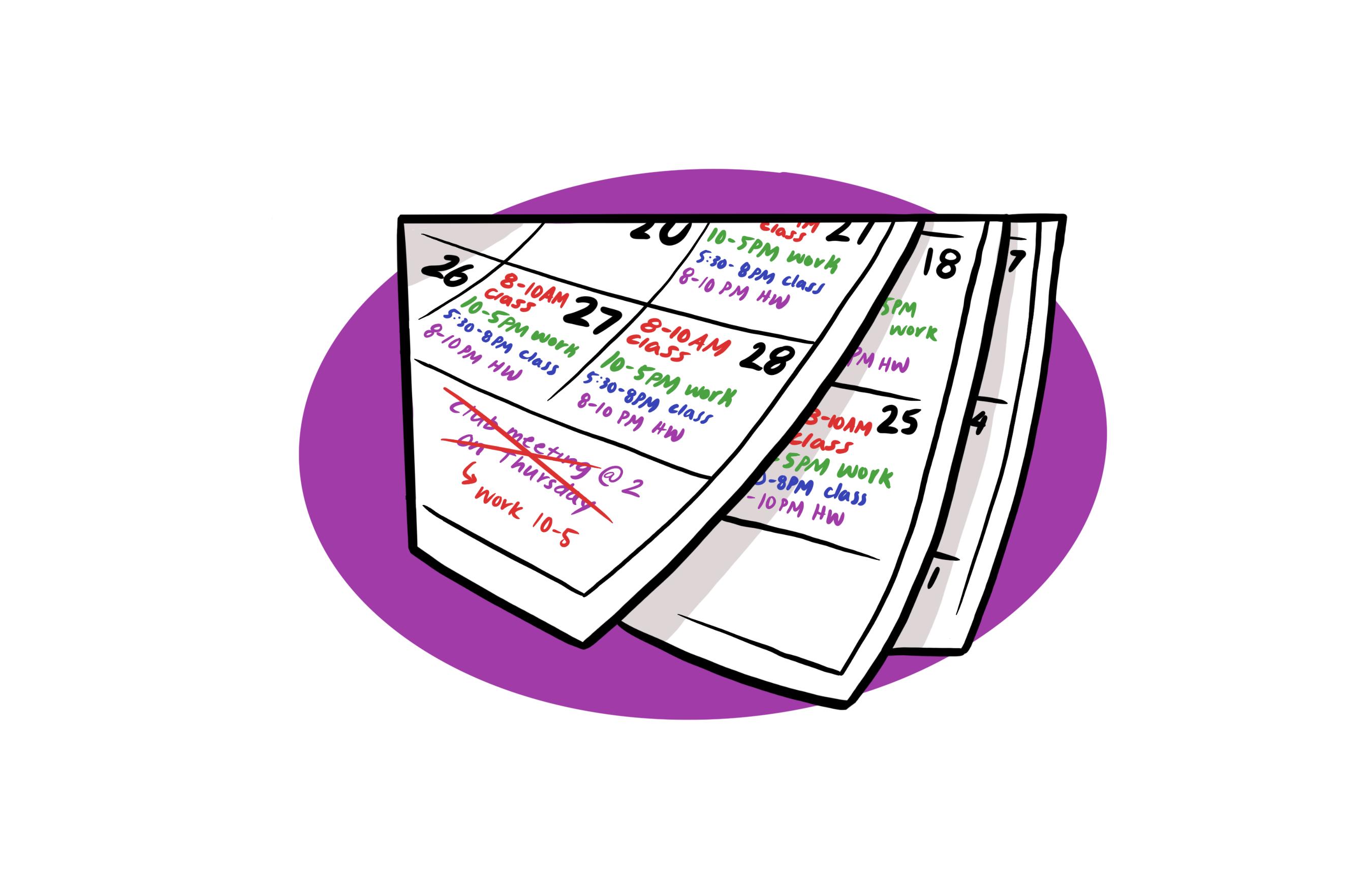
A student explains how working while attending Temple hinders her college experience.
BY ROSAMELIA SANCHEZ LARA For TheTemple News
I always looked forward to living the romanticized “college experience” that’s raved about in high school and teen movies. College seemed like it would be the time of my life, and I couldn’t wait for the promised experiences, like attending campus activities, joining clubs, rushing Greek life and even studying abroad.
Despite my desire to make the most out of my college years, taking advantage of these experiences has been difficult for me because I work approximately 25 hours per week at a retail job while simultaneously dedicating the same amount of time to my classes and homework.
Missing out on the acclaimed experience has caused my mental health to decline, manifesting as constant stress, anxiety and even depressive episodes that make staying focused on my academics nearly impossible.
Balancing school, work and socializing can lead students to ignore basic needs, like sleeping, eating and exercising, which can negatively impact mental health, according to Mental Health America.
Many students have part-time jobs to save disposable funds while in college, but I need to work to support myself. I went to community college for my freshman and sophomore years, during which I lived with my family. I didn’t worry about paying rent or tuition because I could rely on state grants to pay my community college’s low prices.
Eventually, I saved enough money to move to Philadelphia after two years of community college and started my next journey in pursuing journalism at Temple University. I continued to work, but this time, it was to support myself entirely on my own because my family is unable to.
Last semester, I lived independently from my parents for the first time; I
started paying rent, buying groceries and paying for tuition. Although I have financial aid, which is greatly beneficial, I am still solely responsible for paying loans, outstanding balances and any other costs related to school, like textbooks.
When I’m stressed or anxious, I find myself questioning whether I belong at an expensive university like Temple or if I should’ve chosen a cheaper school and location where working a lower number of hours could be enough to support myself without sacrificing my experience.
Balancing work with my academic life has been an impossible task since I transferred to Temple. I try to squeeze in completing all my assignments when I’m not working, which forces me to sacrifice rest. This makes it difficult to focus, causing me to procrastinate and feel burnt out.
I’ve also missed out on the essential college experiences many other students get to participate in.
I’m usually unable to attend sports games, club meetings and events that could positively impact my journalism career, like Klein College’s Internship and Career Fair which took place while I had to work.
Missing this opportunity made me feel extremely pessimistic about my future. I wondered what’s the point of working to be in school if my job keeps me from working on my career. I felt like everything I was doing was counterproductive and pointless.
When I look back at when the idea of the college experience was presented to me, I didn’t expect a constant battle with my mental health to be part of it.
Last month, I decided to take advantage of Temple’s mental health resources, like Tuttleman Counseling Services, because stressing about my financial situation was preventing me from focusing on my school work, and my grades started falling from As to Cs.
I’ve attended a few of their skillbased classes, which tackle different issues, like how to cope with stress and anxiety. To fit these classes into my schedule, I try to work on the weekends and go to Tuttleman once a week after class when I can.
Through my efforts to improve my mental health, I’ve learned to use any free time I can find to participate in activities I both enjoy and find productive for my career and mental health helps me feel like work isn’t consuming my life. Although it’s hard, working to be at Temple will eventually pay off.
I am far from mastering the balance between school and my work life, but I am proud of myself for being intentional about taking the steps to learn how to cope with my emotions. I’m not able to live the college experience I imagined, but I’m creating my own.
rosamelia.sanchez.lara@temple.edu
Letter grades are unfit for this chaotic semester
BY SARAH FRASCA Opinion EditorBrooke Feenie, a freshman graphic and interactive design major, was fulfilling her Analytical Reading and Writing general education requirement and felt connected with her instructor Molly Gorelick, a graduate instructor of record. However, when the Temple University Graduate Students’ Association went on strike on Jan. 31 and Gorelick joined the picket line, she was replaced by a ‘scab,’ the term used to describe strikebreakers.
The instructor who is now permanently assigned to Feenie’s class changed the writing-intensive course by making it asynchronous after it previously took place in-person twice per week and has yet to grade assignments since starting in the class in February, Feenie said.
“I feel like my education was compromised because my actual experienced teacher was taken away,” she said.
This spring semester has presented various unprecedented events, including TUGSA’s 42-day strike, that have disrupted students’ learning experiences. Temple should offer students in strike-affected classes a credit/no-credit grading option to mitigate concerns about impacted grades amid the university’s disorganized response.
During the strike, many instructors were replaced by scabs, while other classes went without teaching and research assistants. Temple claimed more than 80 percent of teaching and research assistants chose not to strike, but Matt Ford, a TUGSA staff organizer, said the percentage of striking members was double compared to the university’s estimate.
Some courses had multiple canceled classes during the strike and others, including Feenie’s, cycled through more than one scab, making it impossible to create conducive learning environments.
Since the strike ended on March 13, some scabs remained in place of original instructors who were not allowed to return for the semester to minimize further
disruption, The Philadelphia Inquirer reported. As the loss and replacement of teaching and research assistants caused a disturbance in some students’ education in various courses, their grades could be negatively impacted.
Feenie is unsure of her academic standing because her assignments have yet to be graded, and her classmates formed a group chat to support each other while struggling with a heavy workload and poor communication from her instructor, she said.
“We’ve basically been left to fend for ourselves and rely on each other because our scab is just really poor at communicating and it’s a huge waste of our money and time,” Feenie said.
Temple offered credit/no-credit grading options in the Spring 2020 semester to offset negative impacts on letter grades as students switched to online learning during the start of the COVID-19 pandemic. The university also allowed the option for one course of students’ choice in the Fall 2020 and Spring 2021 semesters but has since discontinued it.
The credit/no-credit grading system allowed students to feel some re-
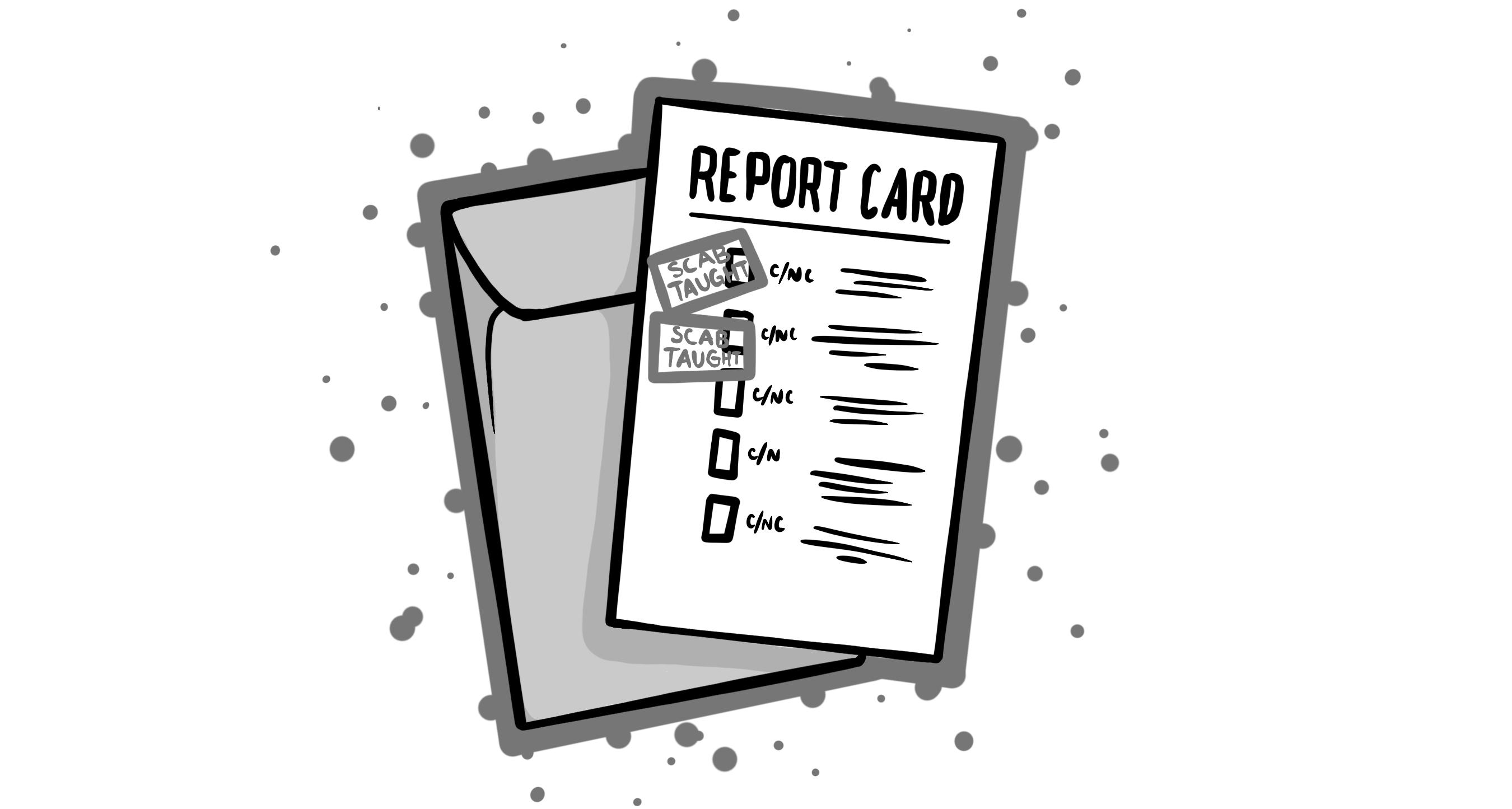
lief as they worried about grades during COVID-19 adjustments. To accommodate another chaotic semester, this grading option should be enacted for strike-affected classes because they’ve offered a devalued educational experience.
On April 2, Temple University Undergraduate Workers Organizing Committee, a group aiming to unionize undergraduate student workers, created a petition that anyone can sign urging Temple to revise grading in scabbed courses as credit/no credit. As of April 17, the petition has 210 signatures, said Ignacio Vasconsellos, a senior Latin American studies major and TUUWOC organizer.
“We felt that the situation in scab classes was not being properly addressed, and then it didn’t seem like there was any organization or institution on campus that was advocating for undergraduates that are stuck in that situation,” Vasconsellos said.
The university did not respond immediately to The Temple News’ request for comment.
During the strike, Temple did provide students time to drop courses without penalty and receive an excused with-
drawal and the option of late-adding another class, The Philadelphia Inquirer reported.
“Admin could have avoided the strike, but they chose not to,” wrote Laurie Robins, TUGSA’s director of organizing, in an email to The Temple News. “The choices they made during the strike and continue to make today place a much lower value on a quality education than TUGSA and undergrads do.”
Although the strike was important for TUGSA members, once it ended, undergraduate students were left to deal with the university’s disorganized handling of the aftermath. Temple should recognize letter grades do not accurately reflect students’ learning experiences in strike-affected classes and offer them a credit/no-credit grading option.
“It’s like the least they can do because obviously, we’ve been through so much emotionally, through this semester alone with everything Temple’s done, so I just feel like, at least a small way to be like, ‘Sorry,’ would just be to make things pass-fail,” Feenie said.
sarah.frasca@temple.edu @sarahhfrasca





LIVE in Philly
PHILADELPHIA’S CHERRY BLOSSOM FESTIVAL
enjoyed shopping from different vendors or watching music and dance performances, while some sat on blankets under trees enjoying the warm weather.
For Mancini, it was the perfect environment for families to get out and enjoy the weather.
unique and it’s nice to see people kind of step out of their comfort zone.”
BY ROBERT JOSEPH CRUZ Assistant Photo EditorWith all of the flowers and trees finally blooming, attendees were wowed by the cultural offerings present at the annual Philadelphia Cherry Blossom Festival.
On April 15-16, people came and celebrated Japanese music, dance, food, clothing, art and literature, among other activities. The festival was held in West Fairmount Park, and was filled with overarching cherry blossoms overlooking the Center City skyline. Visitors

The Cherry Blossom Festival started sharing Japanese culture in 1998 by bringing together people from around the greater Philadelphia area and celebrating the cherry blossom trees, which were gifted by the Japanese government in 1926.

For visitors like sewing instructor Tristan Mancini, experiencing these parts of different cultures is important.
“If the opportunity is there, I think you should absolutely take it,” Scharroo said. “Because if you’re just kind of inside your own culture you don’t know anything else about the world and other people.”
“It’s chill, but it’s also kind of lively,” Mancini said. “There’s lots of families here which is always really nice, it’s very family friendly.”
Elle Evans felt the event was great for getting people of different backgrounds out of their comfort zone and experiencing cultures they may otherwise feel uncomfortable with, she said.
“I think it’s extremely rare to see this many people outside of the Asian demographic coming, not just to listen to the music or look at flowers or eat the food, but they’re going to these performances, they’re going to these lessons, and it’s really cool,” said Evans, an Allentown, Pennsylvania, resident. “I think it’s really
Madame Saito, the creator of the Philadelphia Sushi Roll, and former Temple sushi instructor, held a sushi-making competition where students from her own school competed to make the most creative presentation of sushi, with the winner being chosen by the crowd.
Creating awareness about Japanese culture is what makes the festival a real success, said Madame Saito.
“I think let people know more about cherry blossoms, about the food, and about the culture,” Saito said. “Did you see all the drummers, the dancers? It’s very special.”
robert.cruz@temple.edu
The Japan America Society of Greater Philadelphia held the annual Cherry Blossom Festival. ROBERT JOSEPH CRUZ / THE TEMPLE NEWS Hundreds of people attended the Cherry Blossom Festival in West Fairmount Park.MOVING CLOCKWISE FROM THE TOP


ROBERT JOSEPH CRUZ / THE TEMPLE NEWS
A group of Madame Saito’s students compete in her sushi making competition. One competitor uses a watermelon to make this unique presentation of their sushi.


Drummers take the stage and rock the crowd.

A beautiful cherry blossom tree in West Fairmount Park.








A father kisses his daughter as he walks through the entrance of the Cherry Blossom Festival. Dancers performed at the Cherry Blossom Festival.


HEALTH
Food establishments receive numerous city violations
Within the last three years, Temple’s food establishments recieved roughly 162 violations.
BY FALLON ROTH AND JULIA MEROLA For TheTemple News
Within the last three years, food establishments on Main Campus received 162 violations, according to City of Philadelphia food inspection reports.

Both university and non-university owned dining locations had violations in the two categories in the Philadelphia Department of Public Health’s Office of Food Protection’s report: foodborne illness risk factors and public health interventions, and good retail practices.
While the violations were recorded as part of routine city inspections, they highlight the missteps regarding campus sanitation efforts which has resulted in some students being hesitant to continue using their meal plans. The violations come as the University of Pennsylvania’s dining locations received a total of 100 health code violations during their most recent inspections, the Daily Pennsylvanian reported.
The Johnson and Hardwick dining hall and the Starbucks in the Howard Gittis Student Center were tied with most violations for both sections with 24 between February 2021 to March 2023. Aramark’s convenience location in the Temple Performing Arts Center and take-out spots in the Tyler School of Art and Science Education and Research Center had the lowest with two violations.
On March 13, the Student Center Starbucks had mouse droppings observed on the floor and under a tea bag container and a storage container. At Twisted Taco, pico de gallo and cheese were held at two to four degrees warmer than needed until an employee placed the items into a walk-in box to cool during the inspection.
Among other violations, moist wip-
ing cloths were found on food preparation areas at Johnson and Hardwick’s inspection on March 2. Morgan Hall’s kitchen also had wet floors and slight debris on March 14.
“We are proud to partner with the Department of Health to ensure a safe dining environment for the University community,” wrote Temple Culinary Services in a statement to The Temple News. “Through this partnership, we can assure that all locations are operating within the strict guidelines set forth by the organization. As part of this, any potential issue that comes to light is immediately addressed to ensure the continued safety of our guests.”
The Temple News identified the violations by searching the keywords ‘Aramark,’ Temple’s food licensee, and
‘Temple’ on the Office of Food Protection’s website. The Temple News then compiled and analyzed the data using the publicly available reports for each venue. The website also listed other non-Temple or non-Aramark facilities, like food trucks.
Reports are only posted online and the city’s database maintains the reports for three years.
THE NUMBERS
Forty of Temple’s 162 violations were in the foodborne illness risk factors and public health interventions section and 122 violations were in the good retail practice standards section.
Thirty-eight were corrected on-site, while 16 were repeat violations. Some of the repeat violations ranged from not
having hot water available at hand wash sinks in front of food prep areas to grime and debris accumulation in some catch basins.
“I also think it’s more important to know where your food is coming from not just the quality of the food, but the quality of the place quality, so seeing the inspections, I think it’s a good heads up into what to look for,” said Ashlynd Harvey, a sophomore media studies and production major.
If an establishment fixes a violation during an inspection, the violation is marked on the report as corrected onsite, according to the Department of Public Health.
Temple’s violations have caused Alycia Harvey and Ashlynd Harvey to use their meal plans less frequently.
“We’ve actually been eating out a little more, but sometimes it’s really not an option for us, because the only thing we have is our meal plans,” said Alycia Harvey, a sophomore media studies and production major with an unlimited meal plan. “So honestly, it doesn’t really make me feel good hearing about [violations], but it’s like I have no other option.”
First-year students or transfer students living in on-campus housing are required to purchase a minimum meal plan of 10 meals per week, according to the university’s undergraduate admissions website. The costs of meal plans range from $1,730 to $2,355 per semester.
While Briana Espino does not have a meal plan, she is still disappointed that she is paying for food at establishments that may have violations.
“This is crazy how we’re spending money out of our pockets, and to find out that there’s violations,” said Espino, a freshman on a pre-pharmacy track who frequents dining options in the Student Center or at food trucks. “We’re expecting something that’s going to be good, but we hear that there’s violations like ‘Wow, it wasn’t worth it.’”
THE INSPECTION PROCESS
The city’s goal is to inspect every food establishment annually, said Palak Raval-Nelson, deputy commissioner of the Department of Public Health. Inspections, except for brand new establishments, are unannounced, Raval-Nelson said. Inspectors walk through establishments with a certified food safety staff member, checking the 54 categories on the inspection report.
If any category is found to be noncompliant, another inspection could be required within 30 business days, according to the Department of Public Health. The most serious violations, which are a severe vermin infestation or are imminently crucial to public health, require facilities to cease operations.
If a second inspection happens a couple days after the original, then the establishment could have been required to close and another inspection was needed to assess the risk factors, Raval-Nelson said.
Cease operation orders are lifted if the risk factors improve upon the second visit, said Dawn Kiesewetter, director
of the city’s Environmental Health Services. Another inspection would then be conducted in 30 days to ensure other standards are being followed.
Establishments not in compliance with inspections are required to pay fines. If a facility is still out of compliance during a reinspection then they will have to cease operations and the city may file court action in the Common Pleas Court, Raval-Nelson said.
The city takes all violations seriously, but some risk factor violations are more likely to cause foodborne illnesses, Raval-Nelson said.
For example, in most cases bar signage that warns against drinking while pregnant generally does not rank as high as food being the wrong temperature or a lack of hot or cold running water, Raval-Nelson said.
Philadelphia’s Division of Disease Control also monitors and tracks foodborne illnesses.
HOW IT’S BEING ADDRESSED
Violations are taken seriously and are resolved quickly at locations that
serve people in vulnerable communities, like universities or hospitals, said Alissa Smethers, a kinesiology professor who teaches Food Preparation and Management II.
Non-Aramark affiliated establishments said they addressed their violations quickly.
Temple’s Playa Bowls addressed the findings and violations in their report prior to their next inspection and the store’s opening, wrote Fish Consulting on the behalf of Playa Bowls in a statement to The Temple News.
“This included re-training all shop employees on our stringent operational standards and processes,” Fish Consulting wrote. “Playa Bowls maintains a commitment to the highest food safety standards.”
Saxbys believes their inspection reports represent a particular moment during the work day and that most violations can be quickly addressed. However, the company takes the violations seriously, wrote Haley Samsi, vice president of People and Cafes at Saxby’s, in a statement to The Temple News.
Saxbys had a total of 21 violations between their two Main Campus locations from August 2020 until this March. Six of those were corrected on-site and zero were repeat violations.
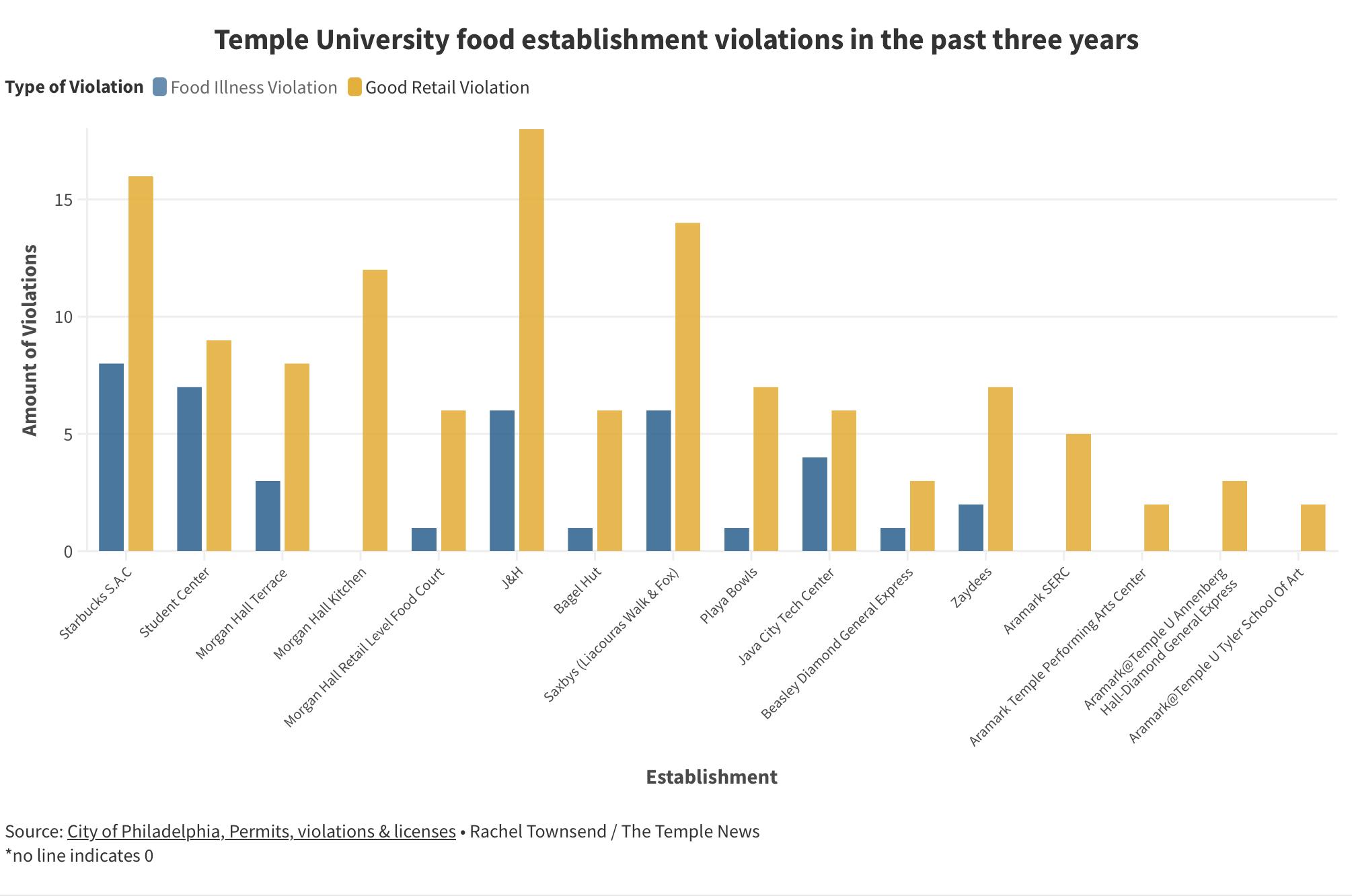
“In addition to inspections by the city, there are state and university standards we need to meet, as well as our own internal procedures, which include daily checklists and quarterly audits,” Samsi wrote.
Bagel Hut, which had seven violations between August 2020 and November 2021, did not respond to The Temple News’ request for comment.
“This is why we have food safety,” Raval-Nelson said. “Certified folks on site, in food establishments, they’re the certified people and they can do their own internal inspections and keep tabs on running the operation as safe as possible.”
fallon.roth@temple.edu
@fallonroth_
julia.merola@temple.edu
@juliaamerola
CAMPUS
Ways to commemorate Earth Day 2023 at Temple
BY DUAY AUGUSTINE Assistant Features EditorThe Temple University community has been involved in Earth Day, a day dedicated to sustainability, throughout its history, with members being involved as early as the first day of action in 1970. Fifty three years later, the community still participates in different activities hosted by student organizations.
“We use this day to kind of tell the story of all the things that we’ve been doing and all the hard work that’s come from not just our our office, but students from across the campus and all the dif-
ferent researchers, teachers, and then in the city of Philadelphia,” said Caroline Burkholder, the Office of Sustainability’s senior sustainability manager.
The Office of Sustainability has two themes for Earth Day this year: climate in the classroom and a circular economy on campus, which involves reusing, swapping and sharing items as much as possible.
Earth Day is taking place on April 22, here’s how the Temple community is commemorating the holiday.
OHC AND ASA CLEANUP
Temple’s One Health Club and Asian Students Association are coordinating a cleanup event for Earth Day from 11 a.m. to 1 p.m. They plan to clean up Sydenham Street between Oxford Street and MONTGOMERY AVENUE
Maanvi Nagireddy, president of OHC, hopes that students will participate in Earth Day and stay involved in sustainability efforts year-round.
“I honestly view it as like a gateway holiday sort of where everyone spends this one day appreciating the earth, and people can do these activities, especially students on campus, and then learn other ways that they can get involved and help protect our Earth,” said Nagireddy, a senior environmental science and biology double major.
ECOREPS EXCURSION
The Office of Sustainability is hosting a trip to the Schuylkill Center for Environmental Education on Earth Day.
The Schuylkill Center is having its annual Naturepalooza event, which involves guided hikes, live music and crafts; attendees must register for the event through Owl Connect.
“This is an example of kind of getting out to the green scene in Philadelphia and being a part of another big initiative and then that’ll be paired with a little bit of a hike in the woods,” Burkholder said.
GIVE + GO GREEN
On April 22, donation bins will be placed in residence halls until the end of the semester for food and clothing donations. All food donations will go to the Cherry Pantry, and clothing will be sold at thrift events in the coming fall semester. The proceeds from the thrift events will be donated to the Cherry Pantry.
Students who want to donate should see the list of accepted donation items on the Office of Sustainability’s website.

Give + Go Green, an initiative from the Office of Sustainability, will also be seeking volunteers during May to sort through the donated items. The organization aims to contribute to a circular economy on campus, one of the office’s themes for Earth day this year.
PROJECT HEAL CLOTHING SWAP
Project Heal at Temple, Temple’s
branch of a national organization meant to aid in the eating disorder recovery process, is hosting a clothing swap outside of Johnson and Hardwick Hall on April 21 from 4 to 5 p.m.
Although Project Heal is not a sustainability-focused organization, Elizabeth Knight, the organization’s president, feels it is still important to get involved for Earth Day.
“Just because our club doesn’t really pertain to sustainability, you know, we still have the ability to bring people together and celebrate Earth Day and to kind of make sure that we’re not being wasteful as we finish up the school year,” said Knight, a senior public health major.
Students are welcome to bring clothes they no longer wear and grab any other clothes they may want; any leftover clothing will be donated to Goodwill. Those who want to participate can register through the link on Project Heal’s Instagram.
TEMPLE CLEANUP CLUB
The Temple Cleanup Club will be holding its final cleanup event of the semester at 12 p.m. on April 23. The organization is collaborating with five other organizations for this event, including the Office of Sustainability and Temple Student Government.
It’s important for students to get involved in sustainability efforts in their community, said Sofia Gonzalez-Ortiz, a senior advertising major and the communications chair of Temple Cleanup Club.
“After trash day and just the effects of the wind blowing trash around a lot of these lots can be filled with trash and it’s where we live, so I think it’s important that students also are involved in cleaning up the areas that they live so that you create healthier and cleaner spaces,” Gonzalez-Ortiz said. Students who want to get involved should follow Temple Cleanup Club’s Instagram page for updates about the location of the event.
The Temple News compiled a list of events for Earth Day for students to get involved in.
Temple’s Cherry Pantry introduces pilot program
BY GIANNA VOGES For TheTanvi Kumar has struggled with balancing school while also being able to afford healthy meals.
“I would go to grocery stores and only buy one carton of food because I couldn’t afford more,” said Kumar, a junior journalism major.
Now, for the past couple of weeks, Kumar has been utilizing Temple’s Barnett & Irvine Cherry Pantry.
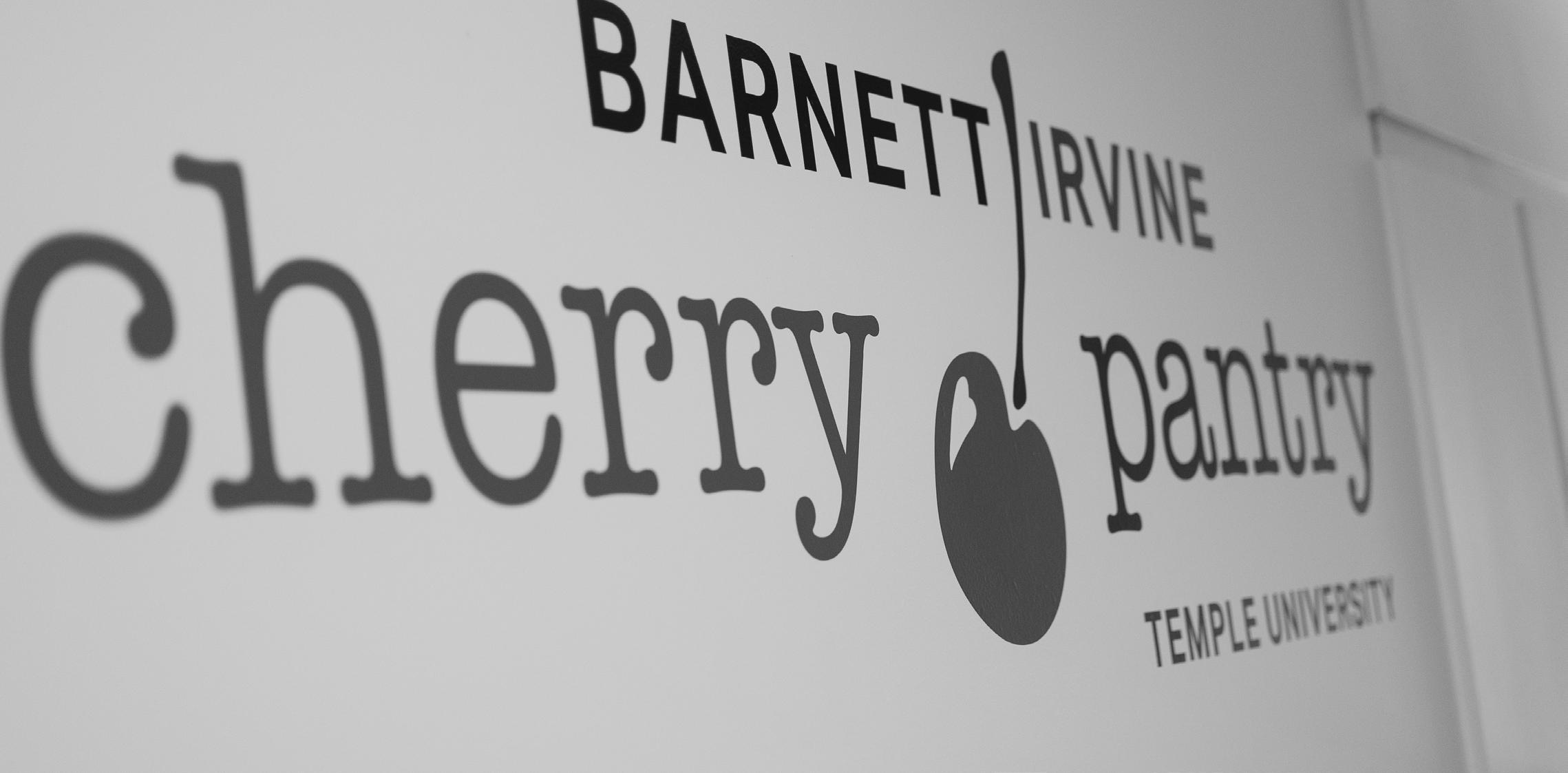
“Going to the Cherry Pantry has really helped me cut down costs and focus on what really matters, like my studies,” Kumar said.
The Cherry Pantry, which provides Temple students with free access to non-perishables, produce and hygiene products, introduced a pilot program on Temple’s Center City and Ambler campuses on April 4 and 5, respectively.
For the remainder of the Spring 2023 semester, the Cherry Pantry will hold distribution events weekly at the Center City and Ambler campuses as part of the pilot program. Students can visit the campuses’ designated distribution sites and pick up a pre-packaged bag that contains 15-20 items that could be found at the Main Campus Cherry Pantry, Ditolvo said.
The program differs from the Cherry Pantry at Main Campus, where students can visit the pantry and pick out the items they want, similar to a grocery trip.
The program was created to explore the extent of basic needs insecurity at other Temple campuses and to broaden its reach. Students are not required to show financial need to use the pantry.
“We exist to support students’ basic needs because it is so important that those are met in college,” said Annette Ditolvo, the program coordinator.
Before this system appears at Center
City and Ambler, the organization needs to determine what type of need exists, Ditolvo said. At Main Campus, the Cherry Pantry receives approximately 195 visitors a week.
“We’re really seeing what the needs are of our students at these campuses,” Ditolvo said.
Twenty-nine percent of students enrolled at four-year colleges experienced food insecurity, according to a 2020 survey by the Hope Center for College, Community and Justice. Foodinsecure students have 42 percent lower odds of graduating, according to a study by Front Public Health.
“We wanted to make as little accessibility barriers as possible, so we’re expanding to regional campuses to make sure that we’re servicing the broader community,” Ditolvo said.
Students who face food insecurity tend to choose cheap and fast food, which can cause lasting health conditions, according to Health Affairs, a journal that covers health-related topics. Additionally, people who don’t have reliable access to food are more
likely to report symptoms of stress and depression.
Chelsea Lubbe, a freshman journalism major and volunteer at the Cherry Pantry, is excited to see the program being expanded to other Temple campuses and believes it will be a valuable asset to students.
Varasiddhi Vinay, a sophomore speech, language and hearing science major who visits the Cherry Pantry, also believes the expansion to Temple’s regional campuses is valuable.
“It makes it a lot easier for college students to focus on their studies versus all of the extra things that come with living on your own,” Vinay said. “If it can be expanded to other students on other campuses I think it’s great.”
There can be a potential stigma against asking for help and visiting a food pantry, according to Health Line. However, Lubbe appreciates the subtleness of the program.
“I think the anonymity of it is something people can find comfort in,” Lubbe said.
Lubbe hopes to see the pilot program expanded to a full pantry, similar to what
is at Main Campus.
“I definitely think it should be expanded, going to the pantry creates a feeling of community,” she said. Ditolvo would like to see more students using this resource and for the service to be expanded, but recognizes that growing numbers unfortunately paint the amount of students in need.
“It’s a double-edged sword when we’re talking about our usage numbers increasing,” Ditolvo said. “It’s great that we’re getting the word out, but it’s concerning to see the amount of need that we have.”
gianna.voges@temple.ede
The pilot program was started to examine student need at Temple’s regional campuses.
Temple NewsROBERT JOSEPH CRUZ / THE TEMPLE NEWS The Cherry Pantry will hold distrubution events at the Ambler and Center City campuses as part of its pilot program.
CAMPUS
Seniors take on Maxi’s 2023 30-day challenge
During April, the Class of 2023 is using Maxi’s challenge to bond and reflect on their time as Owls.
BY DUAY AUGUSTINE Assistant Features EditorLan Tran and Arden Guilfoil were looking for more opportunities to spend time together before graduation and Maxi’s 2023 30-day challenge was the perfect opportunity they were looking for.
“I told Lan that we should go to Maxis more often, and this seemed like the perfect opportunity,” said Guilfoil, a senior nursing major.
For the second year, seniors were challenged to make at least one purchase at Maxi’s Pizzas, Subs and Bar for the entire month of April, excluding Easter Sunday. Those who complete the challenge will receive a Maxi’s Class of 2023 T-shirt and have their photo hung on the bar’s 30 day challenge hall of fame wall.
This year, between 200 and 300 students started the challenge; as of April 17, there are only about 100 students remaining.
Those participating received a punch card at the beginning of April and can purchase any item to be marked off for that day. Aside from the prize, students participate to make memories and enjoy their last month at Temple.
The challenge started last year as a way for seniors to get involved before graduation.
Last year, about 75 seniors completed the challenge, said John Wileczek, a junior risk management and insurance major and bouncer at Maxi’s.
“It was just a unique way to kind of get the seniors involved in the last month of the classes they get a nice picture together at the end of the year and they get a T-shirt and then the picture gets hung up on the wall for forever pretty much here at Maxi’s,” Wileczek said.
Instead of making a quick trip every day, Tran and Guilfoil have used the challenge as an opportunity to spend time with friends before their final semester comes to a close.
“We wouldn’t hang out every day for this long if it wasn’t for that challenge, so it’s been nice because, like Lan said earlier, it gives us an excuse to get out of the house and hang out with our friends, because, again, once we graduate, like we’re all gonna go home and start our jobs and so we’re not gonna be able to spend, you know, maybe a couple of hours together each day,” Guilfoil said.
Throughout their time at Temple, Tran and Guilfoil have enjoyed going to Maxi’s because of its laid back atmo-
sphere and customer base of mostly students.
“They have themed nights every night and like deals so I think that’s cool and you are surrounded by people your age and it’s not just like a variety of people which we don’t really get like when we go to the bars in Center City,” said Tran, a senior nursing major.
Lan and Arden are aware that the cost of the challenge is larger than the value of the reward, but are grateful for the opportunity to make memories before graduation, they said.
“This will be the most expensive T-shirt I think I own,” Guilfoil said.
Kolton Nullmeyer, a senior criminal justice major, also started the challenge
because he wanted a way to spend time with his friends before graduating.
“Some of my friends were gonna do it, I just figured it’d be a fun way to end my senior year,” Nullmeyer said.
Nullmeyer and his friends typically go to Maxi’s because of its convenient location on Main Campus, he said.
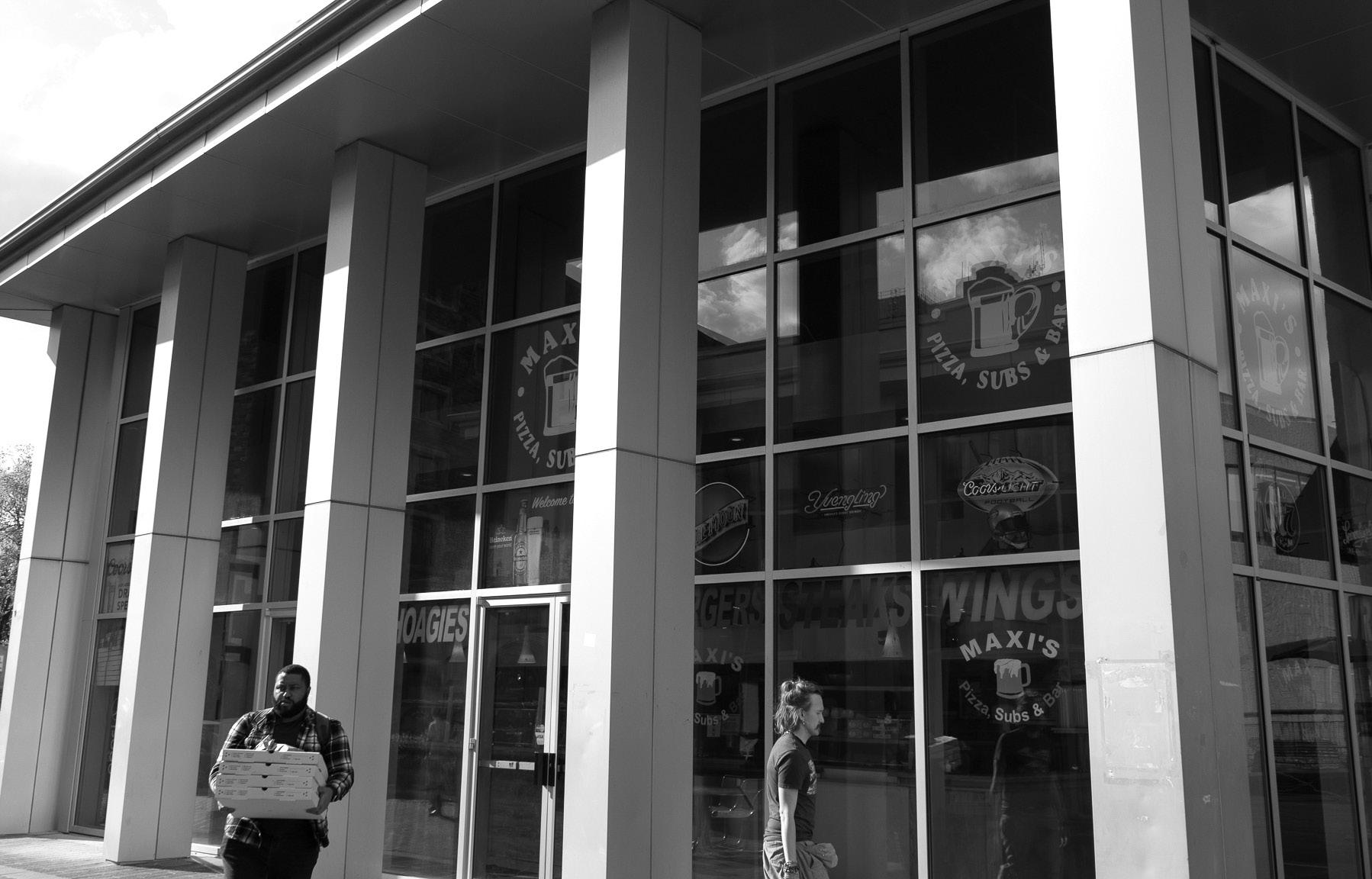
In addition to the 30-day challenge, Maxi’s is a stop on the 2023 Temple Senior Bar Crawl, which includes several bars on and near Main Campus, on May 6.
duay.augustine@temple.edu
ALL IN GOOD FUN


OWLS WORD SEARCH

Find all the words hidden in the across, down, and diagonally, with backwards.
PHILADELPHIA 76ERS CROSSWORD
ACROSS:
2. This team defeated the Sixers in the second round of last year’s playoffs.
3. This Sixers forward has an incredibly large shoe collection.
4. This Nets forward previously played for the Sixers and will not be active during the playoffs.
7. This Sixers center and six-time NBA All-Star hails from Cameroon.
9. This Nets guard is the son-in-law of the Sixers’ head coach.
DOWN:
1. This Sixers forward was drafted by a team that no longer exists.
5. This Sixers guard was drafted after playing at the University of Kentucky.
6. This Sixers guard had a stretch where they scored more than 30 points in 32 consecutive games while playing with their former team.
8. This Nets forward was drafted by the Sixers and traded shortly after.
Temple Rowing finding stroke after Murphy Cup
The group finished with a single medal at the 2023 Murphy Cup Regatta after a gold last season.
BY JORDAN KLIGMAN For Thethey put on an average performance, the Owls are expecting first and second place medals during the course of their competitions to continue their momentum from last season.
Varsity 8 boat. “It’s always good to come out and race against other people, so overall a really good opportunity and a very good showing out.”
learning experience, overall, I think we got really good data, and the only way is up.”
Temple News
Temple Rowing entered the 2023 spring season coming off of one of the best years in program history. The team won the Murphy Cup Invitational on their home river last April for the first time since 1995 and secured a fourth-place finish at the American Athletic Conference championships last April.
After the Doc Hosea Invitational was canceled due to inclement weather, Temple rowing was back on the river hosting the 40th annual Murphy Cup Regatta on the Schuylkill on April 8.

Temple medaled in the Second Varsity 4 race, receiving the bronze in their first event of the season. Despite only medaling once this season after a strong performance and several medals at the Murphy Cup Regatta last year, the Owls are still holding their heads high.
For a team participating in their first regatta of the season, a bronze medal is not a poor first result. Even though
“I think for our first official race of the season it was a strong start,” said head coach Rebecca Grzybowski. “I think we are still working across the board on putting together a complete race from start to finish, but it’s early enough in the season, there’s still a lot more speed to find over the next couple of weeks.”
Although no other boats placed in the top three, the team still showed effort throughout. To Grzybowski, the event is just another learning experience.
“Effort I never question - effort is always high on this team,” Grzybowski said. “We pressure ourselves in practice every day, but nothing can really prepare for racing like racing, so when you’re out there, there’s a lot of lessons that get learned along the way.”
Temple rowers shared the same spirit as their head coach because the team has participated in less competitions this year compared to other teams.
“I think overall it was a good showing out for our first official spring race,” said Lucy Keslar, senior coxswain for the
Given the cancellation of the Doc Hosea Invitational, Temple had just one scrimmage this season before the Murphy Cup. However, with more practice and time, Temple will have many more opportunities to find their speed.
The loss of two all-conference rowers Nadia Bangura and Elaine Tierney was evident in the defeat as well. Communication from senior leadership is crucial in rowing, and relying on a younger roster this season will take time.
“I think that there’s a lot of speed to find between now and our championship, and I think we’re in a very good position to find that speed and carry it through the rest of the season,” Keslar said.
Philadelphia native Riley Gorman was victorious in the Second Varsity 8 last year at the Murphy Cup Regatta, and even though the result was not the same this year, she’s still very optimistic.
“I think we worked really hard in practice; we just weren’t able to execute fully today,” said Gorman, a senior. “But we’re happy because everything’s really a
With more than a month until the Dad Vail Regatta in Camden, New Jersey, Temple Rowing will compete two more times, looking to continue improving. On Saturday, they faced off against several top programs like Tulsa, Miami and Michigan State at the Michigan State Invitational and despite not recording their best times, were pleased with the outcome, Grzybowski said.
It was the first time Temple traveled to Michigan State for races, so the change in scenery and varied water conditions impacted their results.
Despite the undesired outcome, both the coaches and rowers recognize it’s simply part of the season-long process towards improvement.
“It’s just about putting it together again consistently over the full 2,000 meters, so I feel really positive,” Grzybowski said. “I feel optimistic, I think the team does as well, and we’re excited to get back to work on Monday.”
jordan.kligman@temple.edu
MEN’S BASKETBALL
Temple begins search for final five scholarships
Adam Fisher and his staff have started looking for plug-and-play pieces in the transfer portal.
BY JAVON EDMONDS Assistant Sports EditorWhen Aaron McKie stepped down as Temple’s men’s basketball coach, all but five of the Owls’ scholarship players entered the transfer portal.
Sophomore All-American Athletic Conference guards Khalif Battle and Damian Dunn left Temple for Arkansas and Houston, sophomore center Jamille Reynolds transferred to Cincinnati and sophomore forward Nick Jourdain took his talents to Memphis.
Temple is still awaiting a decision from sophomore forward Zach Hicks, who visited DePaul last week as the final stop of his recruiting cycle.
West Catholic Preparatory High School forward Zion Stanford, Temple’s lone incoming freshman in 2023, waited for Temple to hire a new coach before deciding if he wanted to ask out of his letter of intent or not.
On March 29, Temple hired former Penn State associate head coach Adam Fisher to succeed McKie – with McKie assisting in the hiring process as a special advisor to Temple Vice President and Director of Athletics Arthur Johnson.

Fisher’s first order of business was to retain assistant coach Chris Clark, who served on both McKie and former Temple head coach Fran Dunphy’s staffs.
Clark was the lead recruiter for many of Temple’s scholarship players during the McKie era and was the team’s de facto offensive coordinator. With his help, Fisher was able to get sophomore point guard Hysier Miller to withdraw from the transfer portal and convince Stanford to stay committed to Temple.
The Owls were able to land former Maryland-Baltimore County guard Matteo Picarelli in the transfer portal on April 17. He averaged 10.1 points per game last season on 39.4 percent shooting, and will add a much-needed boost to Fisher’s three-point shooting-based offense.
Temple now has eight scholarships filled, and will look to Stanford and the transfer portal for help filling the final five.
Here are the players Temple has expressed interest in:
ADAM “BUDD” CLARK
The class of 2023 guard helped Stanford lead West Catholic to its first ever state championship last month. Clark was committed to Coppin State, but decommitted when the Eagles fired head coach Juan Dixon in March.
Since then, Clark and Temple’s staff have been in communication, and Stanford has expressed a desire to play with his West Catholic teammate at Temple.
An undersized player, Clark is known for his quickness and agility. The All-Philadelphia Catholic League guard excels at blowing by his opponents and uses his sneaky athleticism to finish creatively at the rim.
Clark is a true three-level scorer that can efficiently hurt teams in the paint, in the mid range and beyond the arc. He
also averaged 3.8 steals per game as a senior for the Burrs.
MYLES FOSTER
Foster averaged 12.5 points and 6.6 rebounds for Monmouth last season as an undersized center on a 7-26 team in a one-bid conference.
His six-foot, seven-inch frame limited him to shooting just 46 percent from the floor, a clip that only included two three-point attempts.
QUANTE BERRY
Berry redshirted at Providence last season and with head coach Ed Cooley leaving to replace Patrick Ewing at Georgetown, Berry had every reason to enter the transfer portal.
The former four-star guard was ranked the No. 40 guard in the nation as a recruit and received offers from schools like Auburn, Florida and Maryland.
DYLAN ADDAE-WUSU
Temple had a run-in with Addae-Wusu in its Nov. 21 loss to St. John’s
in the 2022 Empire Classic.
The junior shot 1-for-5 from the field in that game and averaged 9.3 points and 4.4 rebounds per game last season.
CHRISTIAN SHUMATE
After spending his true freshman year at Tulsa, Shumate spent the last two seasons at McNeese State.
Last season, the forward averaged 15.1 points and 9.7 rebounds per game on 54.8 percent shooting, earning him All-Southland Conference honors.
KOBE RODGERS
Temple is one of more than 30 Division I programs to reach out to the Nova Southeastern guard. He averaged 11 points on 46.4 percent shooting from the field and 33.3 percent shooting from three.
javon.edmonds@temple.edu @javonedmonds45
Riches helping to revive Temple’s pole vaulting
Before Riches arrived, Temple had not competed in pole vaulting since 2012.
BY COLIN SCHOFIELD For TheTemple
NewsWhen Allie Riches’ high school coach asked her to start pole vaulting after her freshman year, she had no idea what she was getting into. She was unfamiliar with the sport and had never picked up a pole in her life.
Her mom quickly enrolled her in a local pole vaulting club in Philadelphia and Riches immediately fell in love with the sport.
“It was just kind of a thrill each time you jump, whether you can make it or not,” Riches said. “I just stuck with it because it was something I wasn’t good at that I really wanted to be good at.”
After spending her first three years of college at Rider, Riches transferred to Temple during the offseason for her senior year. Riches has already made history since joining the Owls, breaking Temple’s outdoor pole vaulting record of 4.00 meters.
Temple Track and Field hasn’t had a pole vaulter on its team since 2012 because they didn’t have a pole vaulting coach. Ten years later, Riches is one of the best pole vaulters in the conference and hopes to revive pole vaulting as a key part of the program.
“It feels really good,” Riches said. “At first I was a little nervous because a lot of programs don’t put money towards pole vaulting but I am Temple’s first pole vaulter so they are pulling out all the stops and are really trying to support the team which means a lot.”
At Rider, Riches won a gold medal in the Metro American Athletic Conference outdoor championships during her sophomore and junior seasons. Despite her success, the university opted not to continue funding pole vaulting as part of its track and field program, forcing Riches to transfer.
Growing up, Temple was always Riches’ dream school because of its academic programs, not its athletics. Choosing Temple was an easy yes when
assistant track and field coach Kevin Kelly reached out to Riches in the transfer portal, despite the Owls not having an established pole vaulting program.
Kelly, who is in his second year as a coach at Temple, knew he wanted to bring pole vaulting back to Temple when he was hired because it is a mainstay at many Division I programs, but he just needed the right athlete.
“She has already had a ton of success,” Kelly said. “She was able to take a leap of faith and trust that we can make her better and I think her best days are definitely ahead.”
Adjusting to Temple and its urban environment has been a new experience for Riches after transferring from a small private school like Rider. Initially growing up in Kansas, Riches had never been around cities, so seeing Philadelphia’s diversity made her fall in love. Thanks to a positive attitude in the locker room, she has been able to become friends with
her teammates, who have helped get her acclimated to the city.
“I have just been making sure to hang out with her and check in on her everyday outside of practice,” said graduate runner Isatu Shirek. “That genuine want to be friends has helped us both and has really helped Allie feel more comfortable.”
While adjusting to living in Philadelphia, Riches has also quickly adjusted to a higher level of competition. At the Knights Invitational on March 24, she broke Temple’s outdoor pole vaulting record, with a mark of 3.8 meters and finishing first in the event.
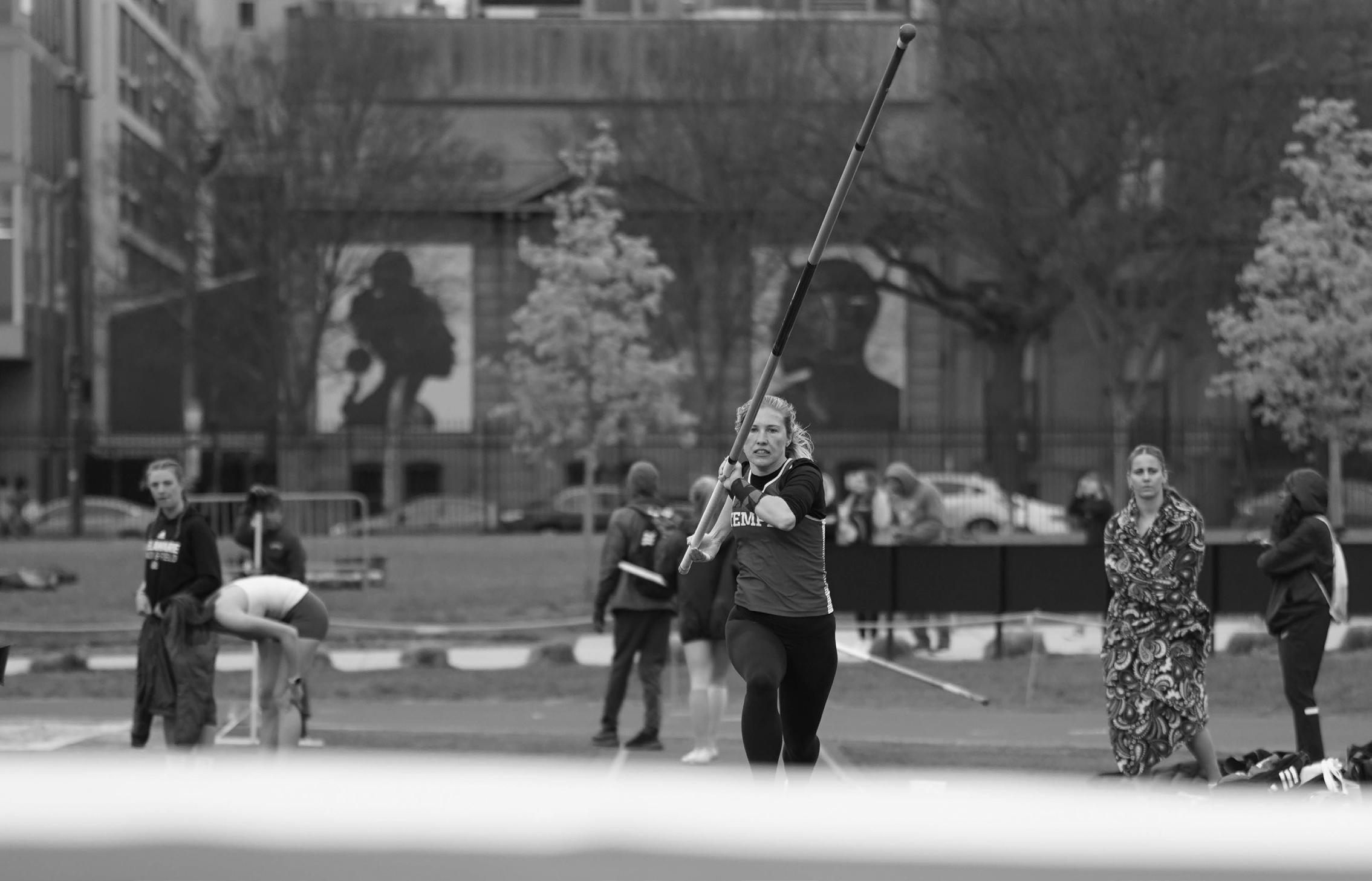
She followed that performance up with even better outings within the following two weeks, breaking her own record two more times by recording a 3.93 meter vault during the Big 5 and Friends meet on April 1, and a 4.00 meter vault during Princeton’s Larry Ellis Invitational just two weeks later on April 15.
The competition at Temple events are much more competitive than the ones Riches participated in at Rider.
At Rider events, Riches knew she was going to win before the events even started, she said.
Despite quickly finding success at Temple, Kelly believes Riches is only scratching the surface of her ability and thinks she has the potential to be even better, he said.
“The expectations are placed very high,” Kelly said. “I want her to be a conference champion and make it to the NCAA final round.”
colin.schofield@temple.edu @colinschofield9
Temple Men’s Golf looking to end recent slump
The Owls had a stretch of bad tournaments, but are looking to turn their season around.
BY NICK GANGEWERE Sports EditorAs much as Temple golfer Conor McGrath relies on his own mindset and fundamentals to thrive as the sole senior on his squad, it takes a team to succeed at the Division I level. Whether it is morale, competition or advice, each teammate looks to one another to help fuel the program.
During their two-month slump, Temple Men’s Golf lacked concentration on the greens, with potential birdies turning into three and four-putts. A sound approach shot has meant little for the Owls, and the team has kicked their play into high gear after a poor 11thplace finish at the Princeton Invitational on April 9, McGrath said.
“I’d say we’ve struggled,” McGrath said. “We have a lot of talent and I think everyone kind of got a little hungrier after last weekend with that poor showing.”
However, that hunger did not lead to results at the Rutherford Intercollegiate in State College, Pennsylvania, on
April 15-16. The Owls finished in 11th place for the second straight week with McGrath, one of the Owls’ best golfers, only shooting a four-over 217 on the tournament.
Their weakest spot was in the four and five spots, with sophomores Joey Morganti and Jake Naese shooting 26over and 28-over respectively. For comparison, Penn State’s first-place finish saw them shoot one-under as a squad.
“We need to play better one through five,” said Temple head coach Brian Quinn after his team finished secondto-last in the tournament. “But obviously our four and five spots really need to step it up.”
Quinn’s teams are known for their course management, a trait that takes experience to develop.
Last season, the team had former golfer Dawson Anders as the captain, a role that McGrath has needed to adjust into. McGrath has been teaching other golfers like junior Graham Chase and sophomore Ethan Whitney how to read their shots, but overthinking has become a problem for Temple, McGrath said.
Whitney and Chase have been some of the only golfers to continue to see individual success during the past three months but know it means little if Tem-
After they began the season 1-1, the Owls won eight straight matches before faltering in late March, losing three out of four.
ple fails to secure tournament victories.
“There’s been a few things I’ve struggled with throughout the semester,” Chase said. “I’m hoping to see some better results.”
Temple head coach Brian Quinn has coached former players like the PGA Tour’s Brandon Matthews who are able to drive the ball further down fairways.
While this current team may not have the same size as previous rosters, their fundamentals and smart decision-making skills are strong. However, overthinking each shot has been a mental obstacle for the team during their slump.
“We made too many doubles and big numbers and didn’t make enough putts collectively,” McGrath said about the Princeton Invitational. “I probably had five to eight holes that I wish I had back.”
Despite several bad showings, the team displayed glimpses of their potential during the ECU Intercollegiate on March 20.
Whitney, Chase and McGrath each finished within the top 20 at the tournament and placed more than 50 spots ahead of the nearest teammate. The team as a whole finished fifth out of 16 teams, their best performance of the season.
Whitney, who posted an eagle in the
dencies and to trust each other when they aren’t playing their best.
tournament and finished 5-over par, felt relaxed at Brook Valley Country Club, leading to a stellar showing.
“Instead of trying to overpower the course, I’ve been trying to think through it more,” Whitney said. “I have been trying to see different ways of how I can play different holes. Conor has done a really good job of showing me that and the same with coach Quinn.”
The team as a whole will need to take each tournament one swing at a time in order to succeed, focusing on the next shot instead of dwelling on mistakes.
Heading into the American Athletic Conference Championships on April 21 in Belleair, Florida, Temple Golf won’t need a complete overhaul to take home some honors.
A victory will take the entire team golfing at their best and feeding off of one another’s energy; with less thinking, shots may begin to fall their way.
“Golf’s funny, you don’t need to switch up a whole lot in order to shave off multiple strokes,” McGrath said. “It’s a lot more just where to miss the ball when you don’t have your best [shot] and just how to get balls up and down and keep it out in front of you.”
nicholas.gangewere@temple.edu @nick_gang16
The new combinations have been working throughout this season. The squad’s doubles team of graduate student Jamie Wei and freshman Maiko Uchijima leads the team with a 28-1 record, ranking eighth in the country.
The Wei and Uchijima duo, along with two more strong doubles teams consisting of sophomore Veronika Kulhava and junior Evie Wei as well as freshman Thamara Frasser Kawaratani and junior Sena Takebe, have helped boost the team’s performances throughout the year.
“I think we have some really strong players like [Jamie Wei] and [Uchijima] in doubles,” Kulhava said. “They always win the point, [Kawaratani] as well.”
The team could have let those losses demoralize them and spiral to end the year, but the squad was able to identify the problem by paying more attention at practice, Kulhava said.
“There was a point where we doubted ourselves because the energy was low,” Kulhava said. “We needed to get more into it at practice and now as you can see we are fine.”
Since the losing streak in March, the Owls have been firing on all cylinders and have won five matches in a row.
The Owls were able to get past their midseason woes because of how tightknit of a group they are. The team’s strong chemistry with one another has allowed them to learn each other’s ten-
The team has built a family-like bond due to the amount of time they spend together. Whether they’re going into Center City for the afternoon or eating at different restaurants as a team, the players are always trying to spend as much time together as possible.
Each player knows exactly what type of ball to set their teammates up with in every situation, helping to earn points no matter where the ball is played.
“[Kawaratani] is really fast and [Jamie Wei] has good touch, so I have to get used to it when we play,” Uchijima said. “Everyone is different and then combined it works out well.”
As they continue to win more matches and climb up the standings, the team feels more pressure to perform to the best of their ability each match.
With the conference play set to begin on April 19, the Owls can feel how close they are to their hard work paying off. However, the team will attempt to stay grounded and enjoy the next few days.
Houston and South Florida will both enter the AAC championship tournament with a 13-8 record, just a few wins below Temple’s 16-4 mark. In total, six teams will enter the tournament with a record above .500.
Although the Owls had an impressive regular season, they will need to play perfect tennis to capture a conference championship.
“The goal is to win the conference championship,” Mauro said. “We have the chance to win. It’s all about peaking at the right time.”
ryan.mack@temple.edu

After overcoming adversity for an impressive regular season, Temple Women’s Tennis enters the conference championship tournament as the top seeded team.

When Temple Women’s Tennis ended the 2021-22 season with a record of 11-6, the team was satisfied with their performance, but knew they needed to improve if they wanted to achieve their goal of reaching the top of the conference standings.

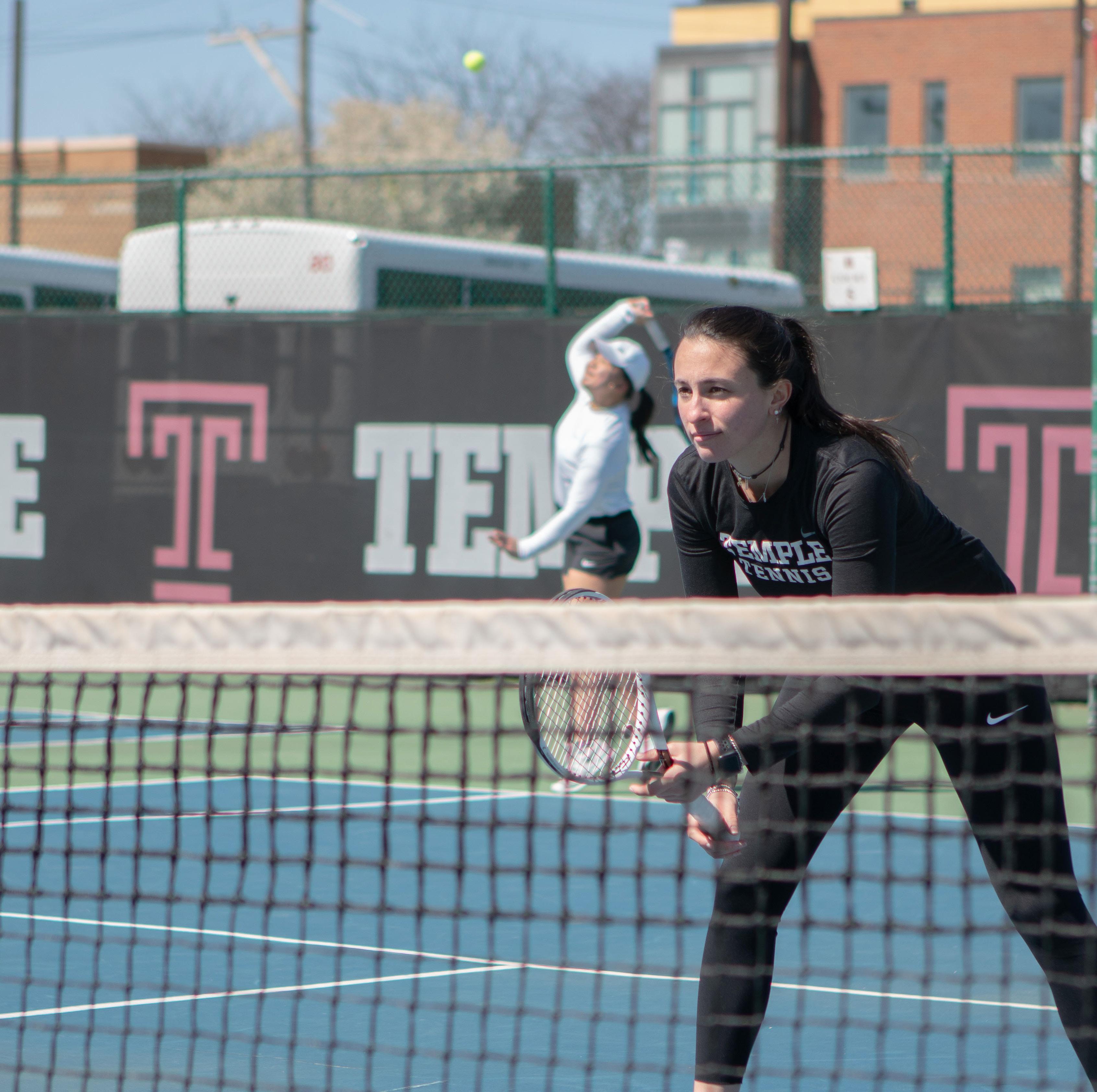
Fast forward almost a full year later, the team has exceeded those expectations, holding a record of 16-4 in the regular season with just the American Athletic Conference Championships left.
The Owls have been on top of the conference for the majority of the season and at one point boasted two nationally-ranked doubles pairs. A combination of talent and experience has led them to this point, but their season
PREPARING FOR CHAMPIONSHIPS
will come to a head in Orlando, Florida, on April 19. Without a conference championship, their successful season will not be remembered in the same light.
Despite their improvements, the team has faced multiple hurdles along the way. Before the season started, they lost junior Vineetha Mummadi for the year with a torn ACL. Head coach Steve Mauro needed to change his playing combinations to make up for the injury.
“Our number one player tore her ACL so she has been out for the year,“ Mauro said.
“We’ve had to mix some things up with our combinations but we have a good group of players.”
WOMEN’S TENNIS | 24
